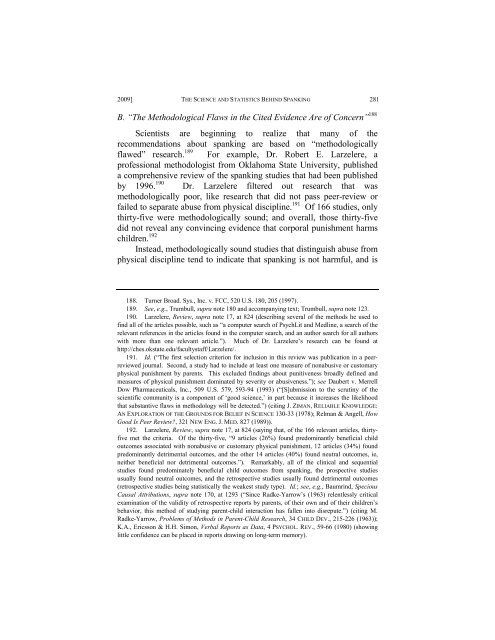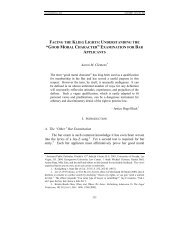The Science and Statistics Behind Spanking Suggests that
The Science and Statistics Behind Spanking Suggests that
The Science and Statistics Behind Spanking Suggests that
You also want an ePaper? Increase the reach of your titles
YUMPU automatically turns print PDFs into web optimized ePapers that Google loves.
11-FULLER_FINAL_AFTERPROOF.DOC 2/17/2009 8:50 AM<br />
2009] THE SCIENCE AND STATISTICS BEHIND SPANKING 281<br />
B. “<strong>The</strong> Methodological Flaws in the Cited Evidence Are of Concern” 188<br />
Scientists are beginning to realize <strong>that</strong> many of the<br />
recommendations about spanking are based on “methodologically<br />
flawed” research. 189 For example, Dr. Robert E. Larzelere, a<br />
professional methodologist from Oklahoma State University, published<br />
a comprehensive review of the spanking studies <strong>that</strong> had been published<br />
by 1996. 190 Dr. Larzelere filtered out research <strong>that</strong> was<br />
methodologically poor, like research <strong>that</strong> did not pass peer-review or<br />
failed to separate abuse from physical discipline. 191 Of 166 studies, only<br />
thirty-five were methodologically sound; <strong>and</strong> overall, those thirty-five<br />
did not reveal any convincing evidence <strong>that</strong> corporal punishment harms<br />
children. 192<br />
Instead, methodologically sound studies <strong>that</strong> distinguish abuse from<br />
physical discipline tend to indicate <strong>that</strong> spanking is not harmful, <strong>and</strong> is<br />
188. Turner Broad. Sys., Inc. v. FCC, 520 U.S. 180, 205 (1997).<br />
189. See, e.g., Trumbull, supra note 180 <strong>and</strong> accompanying text; Trumbull, supra note 123.<br />
190. Larzelere, Review, supra note 17, at 824 (describing several of the methods he used to<br />
find all of the articles possible, such as “a computer search of PsychLit <strong>and</strong> Medline, a search of the<br />
relevant references in the articles found in the computer search, <strong>and</strong> an author search for all authors<br />
with more than one relevant article.”). Much of Dr. Larzelere’s research can be found at<br />
http://ches.okstate.edu/facultystaff/Larzelere/.<br />
191. Id. (“<strong>The</strong> first selection criterion for inclusion in this review was publication in a peerreviewed<br />
journal. Second, a study had to include at least one measure of nonabusive or customary<br />
physical punishment by parents. This excluded findings about punitiveness broadly defined <strong>and</strong><br />
measures of physical punishment dominated by severity or abusiveness.”); see Daubert v. Merrell<br />
Dow Pharmaceuticals, Inc., 509 U.S. 579, 593-94 (1993) (“[S]ubmission to the scrutiny of the<br />
scientific community is a component of ‘good science,’ in part because it increases the likelihood<br />
<strong>that</strong> substantive flaws in methodology will be detected.”) (citing J. ZIMAN, RELIABLE KNOWLEDGE:<br />
AN EXPLORATION OF THE GROUNDS FOR BELIEF IN SCIENCE 130-33 (1978); Relman & Angell, How<br />
Good Is Peer Review?, 321 NEW ENG. J. MED. 827 (1989)).<br />
192. Larzelere, Review, supra note 17, at 824 (saying <strong>that</strong>, of the 166 relevant articles, thirtyfive<br />
met the criteria. Of the thirty-five, “9 articles (26%) found predominantly beneficial child<br />
outcomes associated with nonabusive or customary physical punishment, 12 articles (34%) found<br />
predominantly detrimental outcomes, <strong>and</strong> the other 14 articles (40%) found neutral outcomes, ie,<br />
neither beneficial nor detrimental outcomes.”). Remarkably, all of the clinical <strong>and</strong> sequential<br />
studies found predominately beneficial child outcomes from spanking, the prospective studies<br />
usually found neutral outcomes, <strong>and</strong> the retrospective studies usually found detrimental outcomes<br />
(retrospective studies being statistically the weakest study type). Id.; see, e.g., Baumrind, Specious<br />
Causal Attributions, supra note 170, at 1293 (“Since Radke-Yarrow’s (1963) relentlessly critical<br />
examination of the validity of retrospective reports by parents, of their own <strong>and</strong> of their children’s<br />
behavior, this method of studying parent-child interaction has fallen into disrepute.”) (citing M.<br />
Radke-Yarrow, Problems of Methods in Parent-Child Research, 34 CHILD DEV., 215-226 (1963));<br />
K.A., Ericsson & H.H. Simon, Verbal Reports as Data, 4 PSYCHOL. REV., 59-66 (1980) (showing<br />
little confidence can be placed in reports drawing on long-term memory).

















